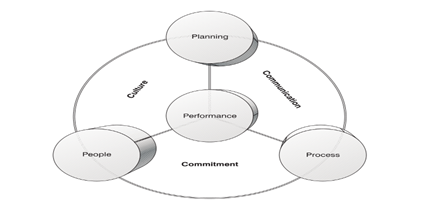Seven Exercises of TQM
There are seven exercises of TQM. Moreover, these are divided into 3C’s and 4P’s. Above all, every business venture go through the “3Cs and 4Ps” exercise. As, it is valuable and insightful exercise. Moreover, it may seems simple, but the these exercise really allows you to think about a business venture in a structured way.

So, let’s discuss the 3C’s and 4P’s.
The 3 Cs of TQM:
They are,
Company
Firstly, you need to think about what type of company you plan to operate. What will it look like? What values will you aspire to? What is your company’s mission? Will it be a corporation, an LLC or a sole proprietorship? Where will it be located? What will you name it?
Basically, you need to think about anything that that defines the type of company you plan to run.
Customer
In this, you need to think about your target audience. Most importantly, what type of customer will most likely be interested in your product or service? What are the demographics? Where will they live? To what income brackets will they belong?
Competition
Last but not least, you really need to consider your competition. That is to say, if you leave this part out, you’ll get eaten alive. Moreover, there is a famous poker saying that sums this up nicely. As, it says that if you don’t know who the sucker is on the table, then it’s probably you. Above all, you need to know your competition very well.
And above all ,you need to learn
- Firstly, how they operate,
- After that, what marketing tactics they use,
- Then, who their supplier’s are,
- Lastly, what financial position they are in and anything else you can dig up.
The 4 Ps of TQM:
They are Product, Price, Promotion and Place (distribution).
Product
This is where you define your product or service. Moreover, if you’re selling something, then define exactly what it will do. Subsequently, you also need to define what it won’t do. What will it look like? How will it be packaged? Will it need special certifications such as a UL listing?
Moreover, you need to clearly specify what you do offer and what you don’t offer. If this is not clear, then you may fall victim to “scope creep” where customers will keep expanding the scope of what you had originally promised them.
Price
In this you have to define, how will you price your product or service? As, if you are selling a product, what price can your target market pay? Do you have any pricing power? For example,if you’re a famous coffee house, then you may be able to sell coffee at higher prices then a local coffee shop.
Moreover, if you’re offering a service, how will you charge for your work? Will it be hourly, fixed bid or some other combination? So, you will look much more professional if you can clearly define your services and your prices to a customer.
Promotion
Here, you have to decide, how will you market your product? What advertising channels will you use? What social marketing strategies will you deploy? Will you consider pay-per-click advertising? Will you attend any trade shows? What is your marketing budget? What return on investment (ROI) do you want to achieve from the money you plan to invest in marketing?
Place (Distribution)
In this you will research about, how will you store and distribute your product? Basically, you need to figure out how you’re going to get your product from your supplier to your warehouse and then to your customer. What shipping methods will these steps require? Will you have a warehouse or will you use a public warehouse?
Perhaps you plan to have everything drop-shipped for you so you don’t have to carry any inventory. What distribution channels will you use? Will you sell through distributors or are you planning on sell direct to your customers?
Besides, the seven exercises of TQM you should know importance of performance. Performance is achieved using a business excellence approach and by planning the involvement of people in the improvement of processes. Moroever, this has to include:
- Planning – the development and deployment of policies and strategies; setting up appropriate partnerships and resources; and designing in quality.
- Performance – establishing a performance measure framework, carrying out self-assessment, audits, reviews and benchmarking.
- Processes – understanding, management, design and redesign; quality management systems
- People – managing the human resources; culture change; teamwork; communications; innovation and learning.
Enhance and Upgrade your management skills by knowing about the Seven exercises of TQM. Become a Certified TQM Professional Now!


